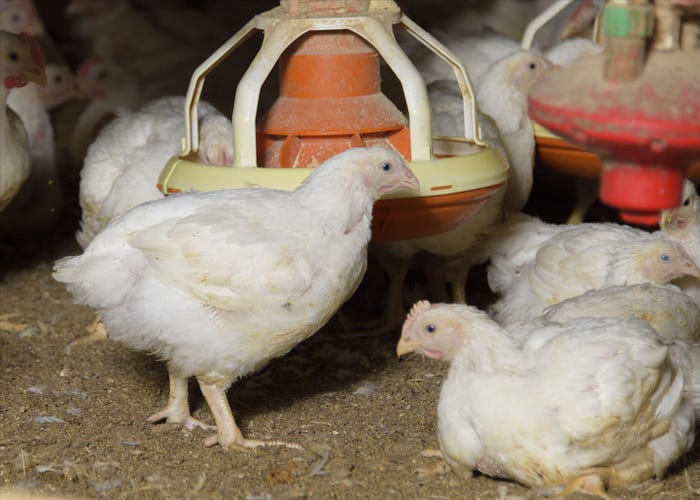Nearly 50 million birds died nationwide from avian flu in 2015, and Mississippi producers are poised to fill gaps.

Mississippi poultry and egg companies are poised for expansions to fill the national gaps caused by the 2015 bird flu outbreaks in other states.
Tom Tabler, poultry specialist with the Mississippi State University Extension Service, said companies are looking for more broiler growers or additional barns on existing farms.
“Poultry companies anticipate strength, at least in the short term, but anything can change that optimism,” he said. “Feed costs are reasonable right now, but a drought or other problems this summer could run up grain prices and, therefore, production costs.”

Mississippi placed 14.5 million broiler-type chicks for meat production during the week ending April 16. In about five weeks, those chicks will be the size of these broilers, which were growing on a Chickasaw County farm on April 15, 2016. (Photo by MSU Extension Service/Kevin Hudson)
Mississippi’s poultry industry benefited from higher egg prices in 2015. Bird flu primarily affected commercial turkey houses and egg layers, but not broiler houses. While most of the state’s poultry industry is broiler production, Mississippi is home to Cal-Maine, the nation’s largest egg production company. None of Cal-Maine’s facilities across the country were struck by the flu virus.
“Avian influenza caused a shortage of eggs and laying hens, so prices for both are strong,” Tabler said. “During the outbreak, export markets dried up for broilers and are still slow to recover.”
During the week ending April 16, Mississippi placed 14.5 million broiler-type chicks for meat production, according to a U.S. Department of Agriculture report. That was 6% fewer chicks than the number placed that same week in 2015 and 1% fewer than the number placed as of April 9. Mississippi hatcheries set 17.7 million broiler-type eggs during the same period, up 1% from last year but down 2% from the previous week.
During the seven-month-long outbreak of 2015, almost 50 million birds died, primarily in Minnesota and Iowa.
Tabler said the best news for Mississippi growers was the absence of a bird flu outbreak this winter.
“We are not completely out of the woods, but every day closer to warm temperatures is a day closer to conditions that will prevent the highly pathogenic avian influenza virus from surviving,” he said. “There was a nationwide effort to increase biosecurity on poultry farms, and that may have been a factor in limiting outbreaks in 2016.”
The only outbreak reported recently occurred in mid-January at a commercial turkey flock in Indiana.
“Our increased biosecurity practices will have long-term benefits for the industry,” Tabler said.
Brian Williams, an agricultural economist with the Mississippi State University Extension Service, said egg prices are the lowest they have been since June 2012.
“Egg prices are running just under a dollar — almost a third of what they were in August, when they reached $2.67/doz.,” Williams said. “Broiler prices have been steady for the last several months at about $1.11/lb.”
Williams said poultry remained Mississippi’s largest agricultural commodity in 2015 — for the 21st consecutive year. The total poultry industry value was $3.25 billion, which included $2.9 billion for broilers, $319 million for eggs and $6.8 million for chickens used as laying hens. Poultry ranked ahead of the estimated forestry industry value of $1.8 billion and the soybean industry value of $1 billion.
About the Author(s)
You May Also Like

.png?width=300&auto=webp&quality=80&disable=upscale)

